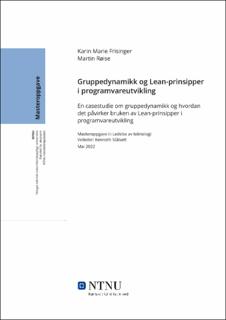| dc.contributor.advisor | Stålsett, Kenneth | |
| dc.contributor.author | Frisinger, Karin Marie | |
| dc.contributor.author | Røise, Martin | |
| dc.date.accessioned | 2022-09-20T17:23:17Z | |
| dc.date.available | 2022-09-20T17:23:17Z | |
| dc.date.issued | 2022 | |
| dc.identifier | no.ntnu:inspera:112633268:113062343 | |
| dc.identifier.uri | https://hdl.handle.net/11250/3019986 | |
| dc.description.abstract | Effektiv programvareutvikling av god kvalitet krever mer samhandling enn hva tradisjonell
produksjon krever. Dette fordrer dermed ikke bare gode arbeidsmetoder, men også effektive
team. Denne studien har sett nærmere på hvordan gruppedynamikken i et team påvirker
bruken av prinsippene innenfor Lean-programvareutvikling.
Studien har sett på to team fra en stor casebedrift, som har kontorer i flere norske byer.
Dataen består av både kvalitativ og kvantitativ data, og har blitt innhentet via litteraturstudie,
intervjuer og spørreundersøkelser. Metoden som er brukt er en innebygget enkeltcase studie
med bruk av metodetriangulering.
Studiens teoretiske grunnlag baserer seg på teorier innenfor Lean. Lean er opprinnelig
en arbeidsfilosofi innenfor produksjon og har sin opprinnelse hos Toyota. Denne filosofien
har senere blitt oversatt til en versjon for programvareutvikling. Det er disse oversettelsene
som utgjør hovedtyngden av studiens teoretiske grunnlag om Lean, og det som beskrives som
Lean-prinsipper i oppgaven. En gruppes evne til å være dynamiske og effektivt tilpasse seg
nye oppgaver og omgivelser omtales som gruppedynamikk. Det teoretiske grunnlaget rundt
gruppe- og teamteori er i stor grad basert på et rammeverk med sammensatte teorier innenfor
sosialpsykologien.
Begge teamene studien har sett på benytter alle prinsippene innenfor Leanprogramvareutvikling,
men ett av teamene bruker flere av prinsippene i større grad enn det
andre. Videre kommer det frem at det teamet som bruker Lean-prinsippene i størst grad, også
har en mer stabil gruppedynamikk. De prinsippene som spesielt blir påvirket negativt av en
mindre stabil gruppedynamikk er forsterke læringsprosesser og se helheten. | |
| dc.description.abstract | Efficient and quality software development requires more collaboration compared to
traditional production. This thus requires not only good working methods but also efficient
teams. This study has investigated how the group dynamics of a team affect the application of
the principles within Lean software development.
The study reviewed two teams from a large case company, which has offices in
several Norwegian cities. The data consists of both qualitative and quantitative data and has
been obtained via literature study, interviews, and surveys. The method used is a built-in
single case study using method triangulation.
The theoretical basis of the study is based on theories within Lean. Lean is originally
a production philosophy and has its origins in Toyota. This philosophy has been translated
into a software development version. These translations make up the foundation of the study's
theoretical basis for Lean, and what is described as Lean principles in the thesis. A group's
ability to be dynamic and effectively adapt to new tasks and environments is referred to as
group dynamics. The theoretical basis around group and team theory is largely based on a
framework with complex theories within social psychology.
It turns out that both teams apply all the principles within Lean software
development, but one of the teams uses several of the principles to a greater extent than the
other. Furthermore, it emerges that the team that uses the Lean principles to the greatest
extent also has a more adaptable group dynamic. The principles that are particularly
negatively affected by a less adaptable group dynamic, are amplify learning and see the
whole. | |
| dc.language | nob | |
| dc.publisher | NTNU | |
| dc.title | Gruppedynamikk og Lean-prinsipper
i programvareutvikling | |
| dc.type | Master thesis | |
